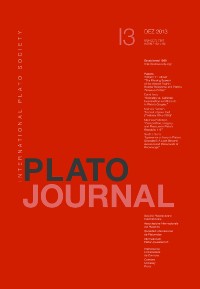Please use this identifier to cite or link to this item:
https://hdl.handle.net/10316.2/34676| Title: | Ignorance or irony in Plato’s Socrates?: a look beyond avowals and disavowals of knowledge | Authors: | Senn, Scott J. | Issue Date: | 2013 | Publisher: | Sociedade Internacional de Platonistas Imprensa da Universidade de Coimbra |
Abstract: | My central thesis is that Socrates of Plato’s “early” dialogues believes he has the very wisdom he famously disavows. Eschewing the usual tack of analyzing his various avowals and disavowals of knowledge, I focus on other claims which entail a belief that he has wisdom par excellence—not just selfawareness of ignorance and not just so-called elenctic wisdom. First, I correct the common misimpression that Socrates is willing only to ask but not to answer questions. Indeed, he describes his own answers as a crucial part of his exhortative message, which, I show, involves not just an exhortation to participate in “elenctic” discussion; his exhortation to virtue is not aimed just at getting his interlocutors to understand that virtue—whatever it is!—must be pursued first and foremost. The elenchus, I argue, is only a prerequisite for understanding the much more substantive lessons of his exhortative practice, which produces “the greatest good”—indeed “happiness” itself. This interpretation, I explain, goes hand in hand with Socrates’ belief that he is a “good man”, invulnerable to injury, who rationally and independently always makes unerring decisions aimed at justice. In light of such beliefs, as well as his fearless claims about others’ injustices, I offer a plausible explanation of why Socrates denies having bona fide wisdom and being a “teacher” of it. | URI: | https://hdl.handle.net/10316.2/34676 | ISSN: | 2183-4105 | DOI: | 10.14195/2183-4105_13_5 |
| Appears in Collections: | Plato Journal |
Files in This Item:
| File | Description | Size | Format | |
|---|---|---|---|---|
| pj13_artigo6.pdf | 625.23 kB | Adobe PDF |  |
Items in DSpace are protected by copyright, with all rights reserved, unless otherwise indicated.
